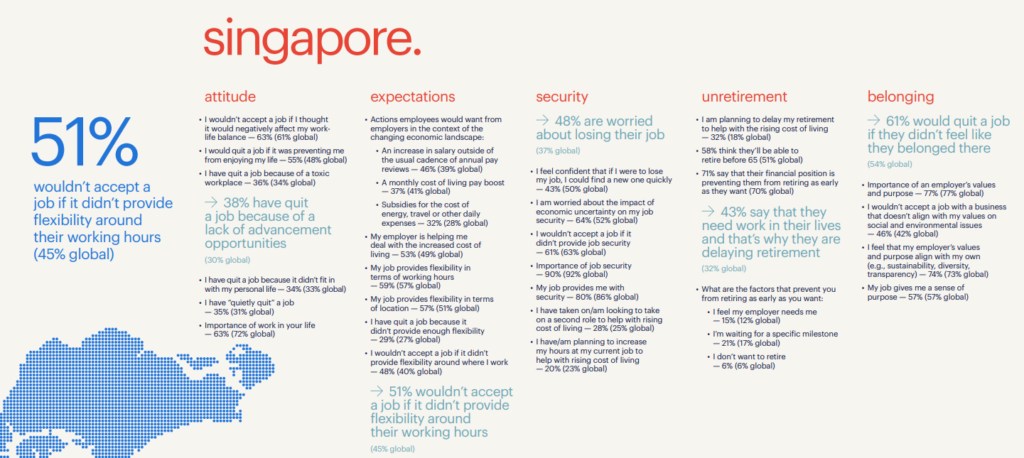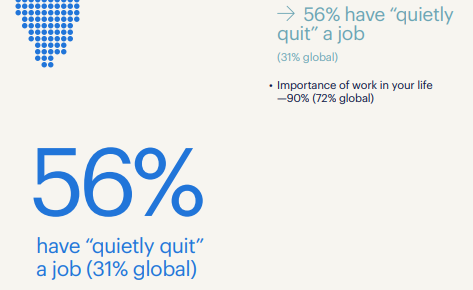Quiet quitting. Contrary to what some may believe, it’s not leaving your resignation letter in your boss’ office in the middle of the night and leaving like Batman. It’s also not ghosting your company when they chase you for your attendance.
No, quiet quitters don’t actually even leave their jobs.
Instead, quiet quitters are essentially vast believers of the “bare minimum” theory. No more, no less. They do what they have to do and leave when they should. No passion or creativity is involved; they’re basically mundane machines working for the money and only the money.
Sounds familiar? Well, you may be a quiet quitter.
You can view the video below to let a blue cat diagnose your state of mind:
Survey Shows Singapore Workers Quiet Quit More Than The Global Average
As it turns out, quiet quitters aren’t that rare in Singapore.
In fact, Singaporeans actually quiet quit more than the global average, as this particular survey by Randstad has revealed:


1,000 respondents between the ages of 18 and 67 were gathered for the survey. Of the 1,000, 35% indicated that they have quiet quit their jobs, a figure four percentage points higher than the global average.
Amongst the quiet quitters, 41% sought to enhance their work-life balance; 38% did it because of low compensation plus the rising cost of living; 33% quiet quit because of elusive career growth opportunities.
Not The Highest
Though higher than the global average, Singapore’s percentile is still not the highest amongst the nations surveyed.
Instead, that accolade belongs to India, with a whopping 56%.

Meanwhile, on the other end of the spectrum, we have Japan with an unbelievable 11%.

And across the causeway, our neighbour Malaysia is at 24%.
The other surveyed nations are as follows:
- Argentina: 34%
- Australia: 31%
- Austria: 30%
- Belgium: 32%
- Brazil: 25%
- Canada: 31%
- Chile: 28%
- China: 20%
- Czech Republic: 36%
- Denmark: 31%
- France: 28%
- Germany: 31%
- Greece: 27%
- Hong Kong SAR: 43%
- Hungary: 29%
- Italy: 25%
- Luxembourg: 25%
- Mexico: 28%
- Netherlands: 19%
- New Zealand: 33%
- Norway: 36%
- Poland: 43%
- Portugal: 41%
- Romania: 41%
- Spain: 29%
- Sweden: 38%
- Switzerland: 29%
- Turkey: 27%
- United Kingdom: 31%
- United States: 29%
It Was Actually a Trend
Believe it or not, quiet quitting was actually a trend. Though on TikTok, arguably anything can become a trend.
Advertised as creating a healthier, more sustainable work-life balance for yourself, quiet quitting gained a lot of traction and followers last year (2022), with many echoing the same sentiments:
“I’ve worked so hard… but I’m still paid the same. What’s the point?”
Indeed, many felt that they were better off quiet quitting, as it meant lesser stress and a more appealing lifestyle.
Some, however, criticised the term “quiet quitting” due to its negative connotation and pointed out that there is absolutely nothing wrong or “bad” about just fulfilling the basic requirements that your job asks for.
There are quiet quitters, and there are quiet firers.
Again, it’s not shooting your employee with a silencer-type gun. It’s also not constantly asking your employees to be quiet.
Instead, it’s quiet quitting, but from the perspective of your boss.
Simply put, the boss acts in such a way that you will quit of your own accord. They would, for instance, restrict you from getting promotions or raises, exclude you from projects and/or hold you to impossibly high standards.
You can view the blue cat down below to understand more about quiet firing:
